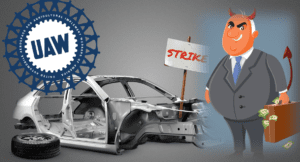 For regular readers of my column, you may be aware that two weeks ago I paid tribute to the workers of America in a special Labor Day article. In it I expressed a need to further lift up the working class and reduce the widening gap between the middle and upper class. Hopefully, I won a few brownie points with blue collar readers with that commentary, because this week I feel the need to comment on the current labor negotiations between the big three automakers and the United Auto Workers of America.
For regular readers of my column, you may be aware that two weeks ago I paid tribute to the workers of America in a special Labor Day article. In it I expressed a need to further lift up the working class and reduce the widening gap between the middle and upper class. Hopefully, I won a few brownie points with blue collar readers with that commentary, because this week I feel the need to comment on the current labor negotiations between the big three automakers and the United Auto Workers of America.
This past Friday the current UAW contract that cover roughly 140,000 auto workers expired. As a result, the union began selective strikes against three manufacturing plants, one from each of the big three US automakers. Luckily as of now, no local plants have been impacted by this strike. But, according to UAW president Shawn Fain, if progress in negotiations is not made by this Friday at noon, more facilities will go on strike.
I hold nothing but respect for the average line worker here in America. They are honest, hardworking, God-fearing people just trying to provide for themselves and their families. With that being said, too often the leaders they choose to represent them, in my opinion, do not have those same attributes.
Recently, while being interviewed on CBS’s Face the Nation, Fain claimed to be fighting against “poverty wages and corporate greed”. In the interview, the union president seemed more interested in punishing these corporations than negotiating a deal that would see union wages increased significantly. https://www.cbs.com/shows/video/9GvZaeul32sCGXQcCPrzV1uC1_4W09jL/
In fact, According to Crysler parent company Stellantis, prior to the strike a 21% wage increase was put on the table and rejected by the UAW, as Fain demanded a 40% increase to match average CEO increases over recent years. Along with that wage increase, the union leader is also demanding a reduction of the work week to 32 hours with all hours exceeding that being paid at overtime rates.
According to Ford CEO Jim Farley, accepting this proposal would bankrupt the century old company. Claiming that the average pay and benefits a worker would receive under such an agreement would equate to annual cost of $300,000 per employee to Ford. https://www.cnn.com/videos/business/2023/09/14/the-lead-jim-farley-jake-tapper-live.cnn
Are UAW workers currently underpaid? I guess that depends on your point of view. When compared to what corporate executives are paid the answer is almost certainly yes. But when compared to what other auto workers here in the US are making the answer is a resounding no.
According to General Motors, the total average hourly cost for an UAW worker is $69, or roughly $143,520 a year. In comparison, Toyota says American workers cost them a third less at $48 an hour. Laborers for Tesla cost even less at about $45 per hour. In comparison, the median automaker CEO salary is 12.3 million, up from 6.9 million in 2020 but still below the average Fortune 500 CEO which is currently paid $15.9 million.
I’m no fan of any person making this kind of money, whether they be entertainers, professional athletes, or corporate executives. However, I am a fan of the free market and allowing competition to determine wages. What I think is amazing about capitalism is when markets are truly free, they will naturally produce wage and profit equilibrium. As demand for a product or service goes up, so do prices and profits. Conversely, as demand for one’s labor goes up, so does the wage paid for that labor.
Considering I have several close friends who work at the Claycomo Ford Plant, I want the American line worker to make more than they do right now. In fact, I want all US workers to make more. But these increases should be based on the laws of supply and demand, not the political ideology of a union boss seeking to overturn fundamental market principles for the sake of equity.
(Past performance is no guarantee of future results. The advice is general in nature and not intended for specific situations)
